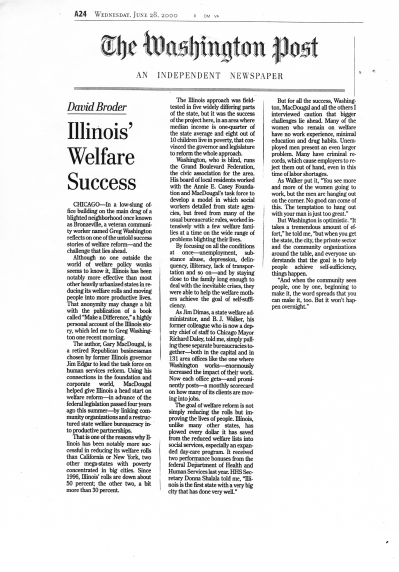The Washington Post
June 28, 2000
Copyright 2000 The Washington Post
By David Broder
 In a low-slung office building on the main drag of a blighted neighborhood once known as Bronzeville, a veteran community worker named Greg Washington reflects on one of the untold success stories of welfare reform--and the challenge that lies ahead.
In a low-slung office building on the main drag of a blighted neighborhood once known as Bronzeville, a veteran community worker named Greg Washington reflects on one of the untold success stories of welfare reform--and the challenge that lies ahead.
Although no one outside the world of welfare policy wonks seems to know it, Illinois has been notably more effective than most other heavily urbanized states in reducing its welfare rolls and moving people into more productive lives. That anonymity may change a bit with the publication of a book called "Make a Difference," a highly personal account of the Illinois story, which led me to Greg Washington one recent morning.
The author, Gary MacDougal, is a retired Republican businessman chosen by former Illinois governor Jim Edgar to lead the task force on human services reform. Using his connections in the foundation and corporate world, MacDougal helped give Illinois a head start on welfare reform--in advance of the federal legislation passed four years ago this summer--by linking community organizations and a restructured state welfare bureaucracy into productive partnerships.
That is one of the reasons why Illinois has been notably more successful in reducing its welfare rolls than California or New York, two other mega-states with poverty concentrated in big cities. Since 1996, Illinois' rolls are down about 50 percent; the other two, a bit more than 30 percent.
The Illinois approach was field-tested in five widely differing parts of the state, but it was the success of the project here, in an area where median income is one-quarter of the state average and eight out of 10 children live in poverty, that convinced the governor and legislature to reform the whole approach.
Washington, who is blind, runs the Grand Boulevard Federation, the civic association for the area. His board of local residents worked with the Annie E. Casey Foundation and MacDougal's task force to develop a model in which social workers detailed from state agencies, but freed from many of the usual bureaucratic rules, worked intensively with a few welfare families at a time on the wide range of problems blighting their lives.
By focusing on all the conditions at once--unemployment, substance abuse, depression, delinquency, illiteracy, lack of transportation and so on--and by staying lose to the family long enough to deal with the inevitable crises, they were able to help the welfare mothers achieve the goal of self-sufficiency.
As Jim Dimas, a state welfare administrator, and B. J. Walker, his former colleague who is now a deputy chief of staff to Chicago Mayor Richard Daley, told me, simply pulling these separate bureaucracies together--both in the capital and in 131 area offices like the one where Washington works--enormously increased the impact of their work. Now each office gets--and prominently posts--a monthly scorecard on how many of its clients are moving into jobs.
The goal of welfare reform is not simply reducing the rolls but improving the lives of people. Illinois, unlike many other states, has plowed every dollar it has saved from the reduced welfare lists into social services, especially an expanded day-care program. It received two performance bonuses from the federal Department of Health and Human Services last year. HHS Secretary Donna Shalala told me, "Illinois is the first state with a very big city that has done very well."
But for all the success, Washington, MacDougal and all the others I interviewed caution that bigger challenges lie ahead. Many of the women who remain on welfare have no work experience, minimal education and drug habits. Unemployed men present an even larger problem. Many have criminal records, which cause employers to reject them out of hand, even in this time of labor shortages.
As Walker put it, "You see more and more of the women going to work, but the men are hanging out on the corner. No good can come of this. The temptation to hang out with your man is just too great."
But Washington is optimistic. "It takes a tremendous amount of effort," he told me, "but when you get the state, the city, the private sector and the community organizations around the table, and everyone understands that the goal is to help people achieve self-sufficiency, things happen.
"And when the community sees people, one by one, beginning to make it, the word spreads that you can make it, too. But it won't happen overnight."